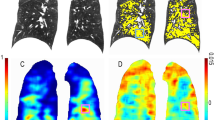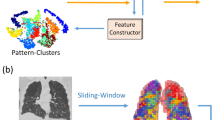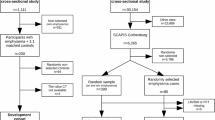Abstract
Emphysema is defined as an abnormal alveolar wall destruction exhibits varied extent and distribution within the lung, leading to heterogeneous spatial emphysema distribution. The progression of emphysema leads to decreased gas exchange, resulting in clinical worsening, and has been associated with higher mortality. Despite the ability to diagnose emphysema on CT scans there are no methods to predict its evolution. Our study aims to propose and validate a novel prognostic lobe-based transformer (LobTe) model capable of capturing the complexity and spatial variability of emphysema progression. This model predicts the evolution of emphysema based on %LAA-950 measurements, thereby enhancing our understanding of Chronic Obstructive Pulmonary Disease (COPD). LobTe is specifically tailored to address the spatial heterogeneity in lung destruction via a transformer encoder using lobe embedding fingerprints to maintain global attention according to lobes’ positions. We trained and tested our model using data from 4,612 smokers, both with and without COPD, across all GOLD stages, who had complete baseline and 5-year follow-up data. Our findings from 1,830 COPDGene participants used for testing demonstrate the model’s effectiveness in predicting lung density evolution based on %LAA-950, achieving a Root Mean Squared Error (RMSE) of 2.957%, a correlation coefficient (\(\rho \)) of 0.643 and a coefficient of determination (\(R^2\)) of 0.36. The model’s capability to predict changes in lung density over five years from baseline CT scans highlights its potential in the early identification of patients at risk of emphysema progression. Our results suggest that image embeddings derived from baseline CT scans effectively forecast emphysema progression by quantifying lung tissue loss.
Access this chapter
Tax calculation will be finalised at checkout
Purchases are for personal use only
Similar content being viewed by others
References
World Health Organization: Chronic obstructive pulmonary disease (COPD), July 2023. https://www.who.int/news-room/fact-sheets/detail/chronic-obstructive-pulmonary-disease-(copd)
Castaldi, P.J., et al.: Heterogeneity and progression of chronic obstructive pulmonary disease: emphysema-predominant and nonn-emphysema-predominant disease. Am. J. Epidemiol. 192(10), 1647–1658 (2023). https://doi.org/10.1093/aje/kwad114
Coxson, H.O., et al.: The presence and progression of emphysema in COPD as determined by CT scanning and biomarker expression: a prospective analysis from the eclipse study. Lancet Respir. Med. 1(2), 129–136 (2013). https://doi.org/10.1016/S2213-2600(13)70006-7
Curiale, A.H., Estepar, R.S.J.: Detection of local emphysema progression using conditional CNN. In: Medical Imaging 2024: Image Processing, vol. 12926, pp. 12926–105. International Society for Optics and Photonics, SPIE (2024)
Dosovitskiy, A., et al.: An image is worth 16x16 words: transformers for image recognition at scale. arXiv preprint arXiv:2010.11929, October 2020. https://arxiv.org/pdf/2010.11929.pdf
Gietema, H.A., et al.: Distribution of emphysema in heavy smokers: impact on pulmonary function. Respir. Med. 104 (2010). https://doi.org/10.1016/j.rmed.2009.08.004
Lynch, D.A., Al-Qaisi, M.A.: Quantitative computed tomography in chronic obstructive pulmonary disease. J. Thoracic Imaging 28(5), 284–290 (2013). https://doi.org/10.1097/rti.0b013e318298733c. https://doi.org/10.1097%2Frti.0b013e318298733c
Lynch, D.A., et al.: CT-based visual classification of emphysema: association with mortality in the COPDGene study. Radiology 288(3), 859–866 (2018). https://doi.org/10.1148/radiol.2018172294, pMID: 29762095
Marin, L., Colombo, P., Bebawy, M., Young, P.M., Traini, D.: Chronic obstructive pulmonary disease: patho-physiology, current methods of treatment and the potential for simvastatin in disease management. Expert Opinion Drug Deliv. 8(9), 1205–1220 (2011). https://doi.org/10.1517/17425247.2011.588697
Martinez, F.J., et al.: Predictors of mortality in patients with emphysema and severe airflow obstruction. Am. J. Respir. Crit. Care Med. 173(12), 1326–1334 (2006). https://doi.org/10.1164/rccm.200510-1677OC, pMID: 16543549
Regan, E.A., et al.: Genetic epidemiology of COPD (COPDGene) study design. COPD J. Chronic Obstr. Pulm. Disease 7(1), 32–43 (2010). https://doi.org/10.3109/15412550903499522
Shamshad, F., et al.: Transformers in medical imaging: a survey. Med. Image Anal. 88 (2023). https://doi.org/10.1016/j.media.2023.102802
Shen, Y., et al.: Federated learning for chronic obstructive pulmonary disease classification with partial personalized attention mechanism. In: 2022 IEEE International Conference on Bioinformatics and Biomedicine (BIBM), pp. 1706–1709 (2022). https://doi.org/10.1109/BIBM55620.2022.9995355
Tang, X., et al.: Emphysema is an independent risk factor for 5-year mortality in patients with bronchiectasis. Clin. Respir. J. 11(6), 887–894 (2017). https://doi.org/10.1111/crj.12432. https://onlinelibrary.wiley.com/doi/abs/10.1111/crj.12432
Valipour, A., et al.: Patterns of emphysema heterogeneity. Respiration 90(5), 402–411 (2015). https://doi.org/10.1159/000439544
Vos, T., et al.: Global burden of 369 diseases and injuries in 204 countries and territories, 1990–2019: a systematic analysis for the global burden of disease study 2019. Lancet 396(10258), 1204–1222 (2020). https://doi.org/10.1016/S0140-6736(20)30925-9. https://www.sciencedirect.com/science/article/pii/S0140673620309259
Woo, S., Park, J., Lee, J., Kweon, I.S.: CBAM: convolutional block attention module. CoRR abs/1807.06521 (2018). http://arxiv.org/abs/1807.06521
Wu, Y., Qi, S., Sun, Y., Xia, S., Yao, Y., Qian, W.: A vision transformer for emphysema classification using CT images. Phys. Med. Biol. 66 (2021). https://doi.org/10.1088/1361-6560/ac3dc8
Xie, W., Fang, Y., Yang, G., Yu, K., Li, W.: Transformer-based multi-modal data fusion method for COPD classification and physiological and biochemical indicators identification. Biomolecules 13 (2023). https://doi.org/10.3390/biom13091391
Acknowledgments
This work was supported by U.S. National Institutes of Health (NIH) grant 1R01HL149877, 5R21LM013670 and Alpha-1 grant 1037165.
Author information
Authors and Affiliations
Corresponding author
Editor information
Editors and Affiliations
Ethics declarations
Disclosure of Interests
The authors have no competing interests to declare that are relevant to the content of this article.
Rights and permissions
Copyright information
© 2024 The Author(s), under exclusive license to Springer Nature Switzerland AG
About this paper
Cite this paper
Curiale, A.H., San José Estépar, R. (2024). Lobar Lung Density Embeddings with a Transformer Encoder (LobTe) to Predict Emphysema Progression in COPD. In: Linguraru, M.G., et al. Medical Image Computing and Computer Assisted Intervention – MICCAI 2024. MICCAI 2024. Lecture Notes in Computer Science, vol 15001. Springer, Cham. https://doi.org/10.1007/978-3-031-72378-0_52
Download citation
DOI: https://doi.org/10.1007/978-3-031-72378-0_52
Published:
Publisher Name: Springer, Cham
Print ISBN: 978-3-031-72377-3
Online ISBN: 978-3-031-72378-0
eBook Packages: Computer ScienceComputer Science (R0)





